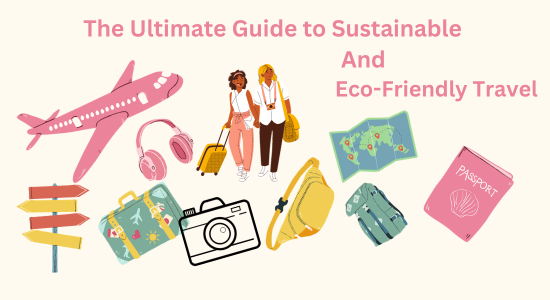This site may contain links to affiliate websites, and I may earn a commission for any purchases made through those links at no additional cost to you.

The Ultimate Guide to Sustainable and Eco-Friendly Travel: How to Explore the World Responsibly
Introduction:
The Ultimate Guide to Sustainable and Eco-Friendly Travel. How to Explore the World Responsibly. Are you an avid traveler with a passion for exploring the world, but also mindful of your environmental footprint? Traveling sustainably and responsibly has become more important than ever. As we venture into new destinations, it’s crucial to be conscious of our impact on the planet. By incorporating eco-friendly practices into our travel routines, we can reduce our carbon footprint and contribute to the preservation of our planet’s natural beauty and resources. Here, we’ll delve into the ultimate guide for sustainable and eco-friendly travel, offering tips, practices, and essential information to help you travel responsibly and with a positive impact.
1. Conscious Packing for Sustainable Travel
– Choose eco-friendly travel gear made from sustainable materials.
– Pack light to reduce fuel consumption and carbon emissions during transportation.
– Opt for reusable and sustainable travel essentials like water bottles, utensils, and shopping bags.
– Use eco-friendly toiletries and cosmetics to minimize harm to the environment.
2. Responsible Transportation Choices
– Utilize public transportation, biking, or walking when exploring destinations.
– Consider eco-friendly transportation options such as electric cars or hybrid vehicles.
– Offset your carbon footprint by investing in carbon offset programs or planting trees.
– Plan direct flights to reduce overall emissions from air travel.
3. Eco-Conscious Accommodation Practices
– Choose eco-friendly accommodations certified for sustainable practices.
– Save energy by switching off lights, air conditioning, and electronics when they are not in use.
– Support hotels and lodges that implement water conservation and waste management systems.
– Engage in community-based tourism to support local communities and reduce the impact on the environment.
4. Sustainable Dining and Responsible Food Choices
– Opt for locally sourced and organic food options to support local farmers and reduce food miles.
– Minimize food waste by ordering only what you can consume.
– Avoid single-use plastics by bringing your reusable utensils and containers.
– Explore plant-based and sustainable food options to reduce your carbon footprint.
5. Respectful Cultural and Wildlife Experiences
– Research and support tour operators that prioritize ethical and responsible wildlife encounters.
– Respect local customs and traditions, and engage with local communities in a culturally sensitive manner.
– Choose responsible wildlife tours that prioritize the well-being of animals and their natural habitats.
– Participate in community-based activities that empower local communities and contribute to sustainable development.
6. Leave No Trace: Ethical Waste Management
– Dispose of waste correctly and recycle whenever feasible.
– Avoid leaving behind any litter and be mindful of the environment when exploring natural areas.
– Participate in beach and trail clean-up activities to contribute to the preservation of natural spaces.
– Support organizations and initiatives dedicated to preserving natural habitats and ecosystems.
Conclusion:
Incorporating sustainable and eco-friendly practices into your travel journey not only reduces your environmental impact but also supports local communities and preserves the natural beauty of destinations. By making conscious choices during your travels, you can contribute to the global effort of sustainable tourism and leave a positive legacy for future generations. Let’s embark on our adventures with a commitment to preserving the planet and ensuring that our travels leave a positive impact on the environment and the communities we visit. Travel responsibly, and let your journey inspire others to follow the path of sustainable and eco-friendly exploration.




